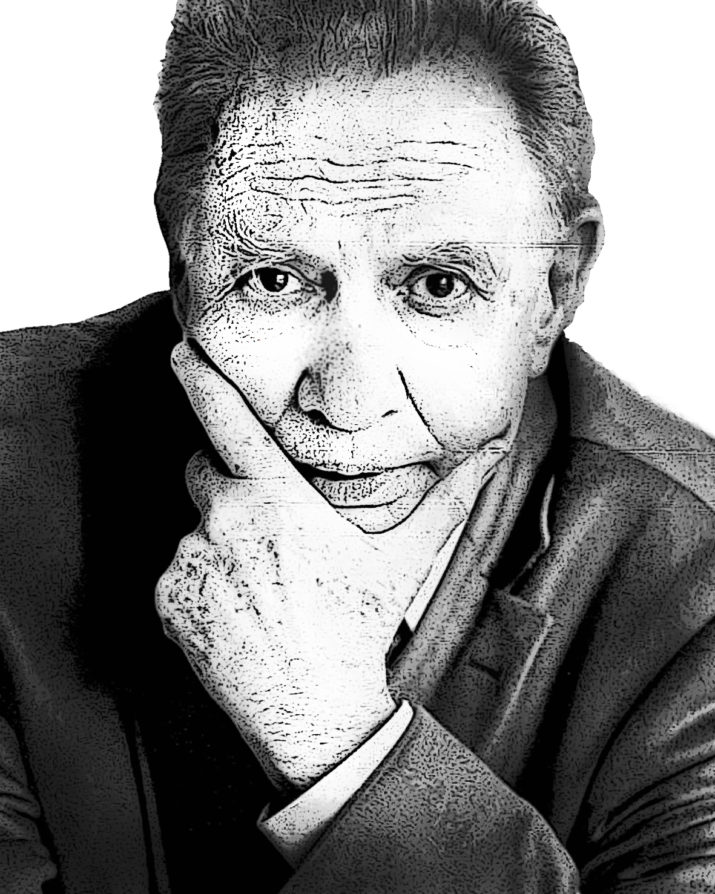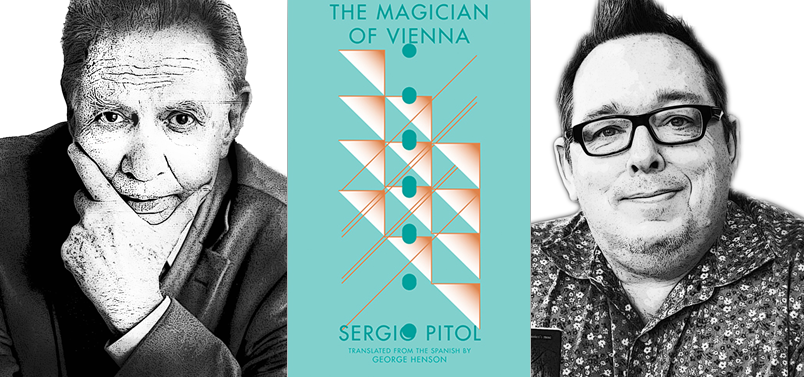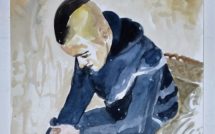

Translated from the Spanish by George Henson.
In Bernhard’s Vienna. Some time ago in Rome, in the fall of 1961 to be precise, I accompanied the Zambrano sisters to a literary banquet. I don’t recall if it was to celebrate the launch of a literary journal or a new publisher series. The locale was a restaurant in the Piazza del Popolo. The faction of Italy’s intelligentsia most privileged by fame seemed to have gathered there. I knew scarcely anyone, but the group dazzled me: the way they moved, greeted one another, approached or avoided others, how they drew a cigarette to their mouths. Everything was luxurious, brilliant, concentrated. It recalled a scene by Antonioni with hints of Fellini, and also of Lubitsch. The presence of those it was impossible not to recognize: Alberto Moravia, Elsa Morante, Pasolini, Carlo Levi. Who had not seen their photos in the press or on the cover of their books?
María and Araceli Zambrano had lived until a few years before in the piano nobile of the palace on whose ground floor the restaurant was located. Listening to them, one would think that they had never been happy, except in that apartment with sprawling balconies above the piazza. Some guests, who were accustomed to seeing them in that setting, greeted and congratulated them as if they were the hostesses. One writer greeted the philosopher with obvious affection, and she seemed to feel at last inter pares and no longer among shiny but in the end tinpot puppets. Suddenly I found myself seated at his table with my Spanish companions. I saw him only on that single occasion, but he was the intellectual who most impressed me during that time in Italy. From that day on, I read his literary page in Il Espresso weekly, and those readings complemented the profound impression that he left on me that day. I admired his intelligence, his heterodoxy, and above all the casual and elegant irony that charged his words with mystery. It was Paolo Milano, a celebrated and at the same time almost secret man of letters, a Jew, as his name indicates, who in 1939 had to emigrate to New York to avoid the racial laws of fascism. On that occasion I learned of his deep passion for the theater and his dazzling erudition on North American literature. Seated beside him was an odd couple: a Sicilian aristocrat of intelligent conversation, and a small man, disheveled, with a slight hump and intense eyes that reminded me inescapably of Raskolnikov’s. He worked as a literary assistant to Fellini, I believe. Minutes later two guests approached the table on different flanks; one of them was robust, with a sacramental appearance, one of those men who seem never to have had a youth, with slightly exaggerated gestures and expressions, and the other, thin, nervous, eccentric, with intensely dark hair, carrying perhaps forty well-worn years. Both walked up to greet María Zambrano. The older one was Mario Praz, the most eminent Italian scholar of English literature and author of a contemporary classic: The Romantic Agony. Upon seeing Paolo Milano, he suddenly stiffened; he mumbled vague words of greeting, did an about-face, and sat at the table beside us, directly behind Araceli Zambrano. The other man, Rodolfo Wilcock, an Anglo-Italian born in Argentina, was an eccentric and intelligent character, also a friend of everyone. I was the only stranger at the table. They were all friends and, however, I felt that an unbearable electric tension had formed around the table. The Zambrano sisters had ceased to be the perfect hostesses from before to become two terrified women, not knowing where to take refuge, or at least where to bury their head. All the helplessness of the world had engulfed them. Praz turned to ask the Sicilian countess if she had understood something that had been published in the press that morning. And before she could answer, Paolo Milano exclaimed in a loud voice: “No, non ho capito, sai, sono un mediocre senza rimedio,” and smiled with the serenity of Buddha. Everyone burst into laughter; myself included, without knowing at what, or why. Praz turned his back, clearly bothered, and did not direct his attention to our table again. Détente was long in coming. María and Ara Zambrano were susceptible to certain fears, and Mario Praz was considered an absolute jinx in Rome, the gettatore par excellence; to top it off, the Zambrano sisters had sensed several months before that Wilcock possessed those same evil powers, although less infallible as those of Praz. I imagine that the panic had had an effect on the table, and that was why, at the beginning, only the brave Milano had spoken. He detested Vittorini, his novels, his translations and prologues, his journals, his character, his literary taste, his human quality, and he said all this with a candid voice and friendly smile, as if he were enumerating the writer’s best attributes; later he directed his darts at the Mann family, which he met in his youth, at the end of the twenties or beginning of the thirties, at a spa on the Adriatic, where his family had a house next to the one the Manns occupied every summer. They seemed caricaturesque. They would appear in three taxis, and Katia Mann would take charge of supervising the unloading of the trunks and suitcases. Any act, no matter how quotidian, was transformed into a ceremony. There emanated from that house during the entire season an air of grandeur royal. He made Katia feel guilty that Thomas, her husband, had not become the good writer that he promised to be. If anyone else had hurled those charges at two writers whom I revered, I would have seen red, but with Milano it was hard to be offended. All of a sudden the topic of the Eichmann trial in Jerusalem came up. The conversation turned general. We spoke of the Holocaust, anti-Semitism, and its diverse manifestations. And at a given moment Milano said that the most sinister stories he knew about the subject came from Austria, specifically from Vienna, and he related events from March of 1938, heard in turn, he clarified, from the mouth of the English writer John Lehmann, who witnessed them. On March 15, 1938, the annexation of Austria by Germany was declared. On that day a crowd of one million Austrians deliriously saluted the Führer in Heroes’ Square. Lehmann had spent a long period of time in Vienna. Like his friends, Isherwood and Auden, he was attracted to the Germanic intensity of the time, the contact between high culture and plebeian life, between pure spirit and corporal plenitude, and also the lack of sexual taboos that in their country remained as steadfast as in the Victorian era. But Lehmann was bothered and frightened by the vulgarity of Berlin, the tone of the three-penny operas in which blows and guffaws were mixed gaily. He preferred, instead, to reside in Vienna, in a perfect flat. The building was occupied by well-known families: highly qualified professionals, aristocrats, people of leisure, of elegance, and perfect manners. It pleased Lehmann to witness the casual meetings between neighbors in the great hall on the ground floor, to watch them greet each other with a courteousness that seemed to emanate from their very blood, draw their hand to their hat, bow slightly, make passing comments about some aspect of the weather, or the performance of an opera by Wagner, Mozart, Richard Strauss, bow their head again woodenly, bid farewell, and go on their way. In the face of the indifference of the British, the young and winsome Lehmann felt as if he were in a high school of manners that seemed to transmit greater meaning to his life. Suddenly, the writer began to notice a tension in the city, a growing anxiety and excitement in the street, in the cafés, outside the theaters, even though in his building perfect manners, implacable diction, movements regulated with military precision did not exhibit the least modification. Everything continued this way until the fateful March 15, 1938. That day and night there began an orgy of blood presided over by the old deities that apparently persist in the fog of the Germanic soul. This circle of perfectly cultivated ladies and gentlemen were dragged to their most distant origins, the cave, the fire around which they listened to the nearby howling of wolves. That day they themselves became wolves. Their howls were more terrifying than those of the beasts. Upon leaving his apartment Lehmann witnessed a terrible scene in the hallway. His immediate neighbors, a reputed Viennese attorney, accompanied by his two sons, university students, were dragging an elderly married couple downstairs from the rooms on the floor above. Their swollen bodies trembled with convulsions; muffled cries escaped from the elderly woman’s bleeding mouth. Suddenly, the doorwoman appeared with a large leather sack, kneeled before the old woman and took off her shoes. Lehmann, paralyzed with fear, muttered something, he didn’t even know what, to which one of the youths, pointing to the bodies, replied only: “Juden! Juden!” From the other floors could be heard ferocious voices as well as the cries of the victims.
I was in Vienna this year, after a twelve-year absence. My arrival coincided with a mass rally of three hundred thousand people who protested against the return of Nazism to the country, precisely in Heroes’ Square, the same one where one million Austrians frenziedly cheered Hitler. During the ensuing days I was forced to tolerate the taxi drivers, business employees, hotel staff, who upon seeing that I was a foreigner felt obligated to enlighten me. We were finally liberated, they would say. Haier has liberated us from the tyranny of socialists and Jews. I left Vienna days ahead of schedule; I felt as if I were breathing poisoned air.
Paolo Milano’s tale in Rome, in the end almost a gasp, has made me, more than any other spoken or written testimony, viscerally abhor national socialism. As I left the restaurant, someone said, Fellini’s literary assistant I believe, that something like that could happen anywhere in the world, except the repetition of acts like those, to which Ara Zambrano responded that we shouldn’t deceive ourselves and began to recount almost incoherently the circumstances surrounding her years in German-occupied Paris, and the interrogations to which the Gestapo subjected her while her husband rotted in their dungeon, before executing him.
Herman Bosch was arrested at his home the day following Hitler’s arrival in Heroes’ Square. That same day, Franz Werfel and Alma Mahler, his wife, received a telephone call warning them that a group of Nazi youths had listed them as Jews and Communists. They were saved by a hair’s breadth. The Swiss musician Rolf Liebermann watched from a window at the Opera as the barbarians dragged sculptures from the house of Mahler’s daughter. Broch himself writes to a friend that he could describe his time in prison as “comfortable” in relation to the terror that he experienced later in the streets, where all he heard was the rhythmic cry: “Ein Volk! Ein Reich! Ein Führer! (One people, one State, one leader), chanted all the time by the masses. It was the same demented chorus that Professor Schuster’s widow hears for many years, that drove her to her death in the final scene of the last, extremely intense drama by Thomas Bernhard: Heroes’ Square.
Sergio Pitol Demeneghi is one of Mexico’s most acclaimed writers, born in the city of Puebla in 1933. He studied law and philosophy in Mexico City. He is renowned for his intellectual career in both the field of literary creation and translation, and is renowned for his work in the promotion of Mexican culture abroad, which he achieved during his long service as a cultural attaché in Mexican embassies and consulates across the globe. He has lived perpetually on the run: he was a student in Rome, a translator in Beijing and Barcelona, a university professor in Xalapa and Bristol, and a diplomat in Warsaw, Budapest, Paris, Moscow, and Prague. Pitol is a contemporary of the most famous authors of the Latin American “Boom,” and began publishing novels, stories, criticism, and translations in the 1960s. In recognition of the importance of his entire canon of work, Pitol was awarded the two most important prizes in the Spanish language world: the Juan Rulfo Prize in 1999 (now known as the FIL Literary Award in Romance Languages), and in 2005 he won the Cervantes Prize, the most prestigious literary prize in the Spanish language world, often called the “Spanish language Nobel.” Deep Vellum will publish Pitol’s Trilogy of Memory in full in 2014-2015 (The Art of Flight; The Journey; The Magician of Vienna), marking the first appearance of any of Pitol’s books in English.
George Henson is a literary translator and lecturer of Spanish at the University of Oklahoma. He has translated the three volumes that comprise Sergio Pitol’s Trilogy of Memory, The Art of Flight, The Journey, and The Magician of Vienna. Other translated books include Elena Poneiatowska’s The Heart of the Artichoke and Luis Jorge Boone’s Cannibal Nights. He is a frequent contributor to World Literature Today and Asymptote.
This excerpt from The Magician of Vienna is published by permission of Deep Vellum Publishing. Copyright © 2005 Sergio Pitol. Translation copyright © 2017 George Henson.
Photo: Sergio Pitol, private
Photo: George Henson, private
Published on February 1, 2017.




